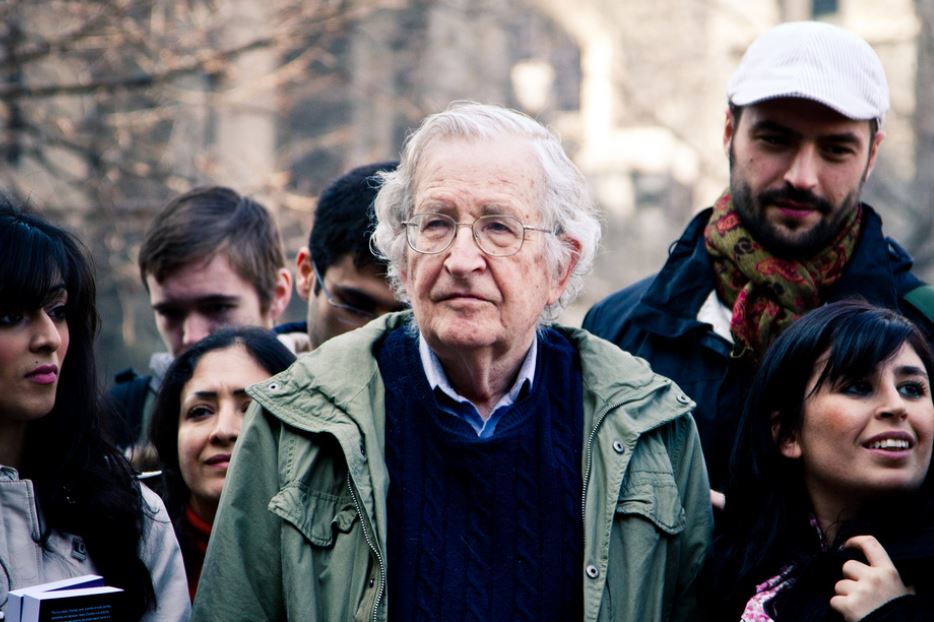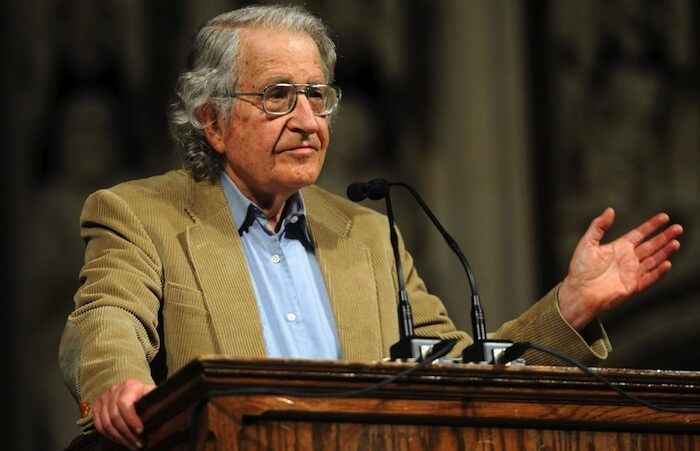Noam Chomsky analyzes the coronavirus pandemic in the context of neoliberal capitalism’s failures, climate change, potential nuclear disaster, and Donald Trump’s authoritarianism.
April 13, 2020
Story Transcript
This is a rush transcript and may contain errors. It will be updated.
Marc Steiner: Welcome to The Real News. I’m Marc Steiner, great to have you all with this. We’re about to have a conversation with Noam Chomsky, who we all know is considered the founder of modern linguistics, but he and his ideas and his activism have been an inspiration to many across the globe who seek social, economic and racial justice. Just a personal anecdote, I’ve been reading him since 1967 when he wrote his essay against the Vietnam War called The Responsibility of Intellectuals, and I have had the pleasure of interviewing him a couple of times in the past. He’s written well over a hundred books, appears often on my colleague, Amy Goodman’s, Democracy Now! And his latest book, which I just finished, is Internationalism or Extinction. And as we face the COVID-19 pandemic and the failures of Neoliberal capitalism, who better to spend some time with than Noam Chomsky? And so, Noam Chomsky, welcome to The Real News, good to have you with us.
Noam Chomsky: Pleased to be with you.
Marc Steiner: So let me just begin. You have written, in your book and at other times, about the remembrance of Hitler and the rise of fascism. And here we find ourselves at this moment with facing the depth of climate change, under Trump, the doomsday clock is getting closer and closer to midnight, “Seconds” as you’ve said recently, and so all this coming together and we have this coronavirus pandemic exacerbating this march towards, potentially, a right wing populous authoritarianism. Looking back into history, I’m just curious where you think we are now. And I was thinking about a quote that you wrote in your book from Mark Twain, which I love, which is, “History doesn’t repeat, but sometimes rhymes.” And we’re in something, a strange rhyming period. Talk a bit about where you think we are.
Noam Chomsky: Well, I’m old enough to remember, as a child, listening to Hitler’s speeches over the radio at the Nuremberg rallies. I couldn’t understand the words when I was six years old, but I could easily understand the mood. And it was frightening, the adoration of the screaming crowds, the ranting, and also seeing what was beginning to happen in the ’30s as fascism began to spread, and it seemed inexorably over much of the world with these hideous leaders in charge. And these memories do come to mind when I listened to one of Trump’s rallies, for example. There’s some similarity, the worship of the crowds, his very effective use of techniques of manipulation. So for example, the constant flood of lies and self contradictions and so on, which is very well designed to undermine the very notion of truth. It disappears, so you just listen to the great leader.
He’s doing very much the same, I presume, consciously, with regard to the coronavirus. If you look over his statements since January, they range all over the map, “It’s just the flu, don’t worry about it. It’s a terrible pandemic, and I was the first person ever to notice it,” and anything else. That’s a great technique. It assures that he’ll be vindicated. Whatever happens, you’ll find some statements he made that was accurate. When you shoot arrows at random, something’s going to hit the target. And when you have adoring crowds who grasp any word of the leader, when you have an echo chamber called Fox News, where they loyally repeat every bit of nonsense that he’s saying, then it’s a terrific technique of domination and control.
But before, there were people, including good scholars of fascism like Robert Paxton, who argue that we may be in danger of coming to something like fascism. Well there’s something to that. I think we should be reserved about it. Fascism was an ideology. It wasn’t just screaming and ranting at a door in crowds. It was an ideology of state takeover and domination and control of everything, of course, labor unions and so on, but also state control of business. [inaudible 00:04:49], it was called. That’s almost the opposite of what we have now. We have business-control of the state, under Trump, deepening. His primary constituency is wealth and corporate power, and he lavishes gifts for them. It was very striking at the Davos meetings in January, you know the meetings of the masters of the universe? They, very much, dislike him. The corporate executives, they didn’t like his style or anything else about him. He gave the leading speech. They liked it because he talked about his tax cut, a huge gift to the wealthy and the corporate sector, stabbing everyone else in the back. Yeah, they thought that was great.
So he understands how to serve is primary masters, how to keep the adoring crowds under control, but there’s no ideology. The ideology is simply, “Me. I’m a megalomaniac psychopath, and I just want what’s good for me.” That’s not fascism. It’s something pretty awful, but not fascism. With the coronavirus, it’s very important to… It’s a terrible crisis. We’ll recover from it at, maybe, horrible cost, but we will recover. And there are two things that are important to keep in mind. One is, there’s going to be more of these crises. Now this particular one has been predicted for 10 or 15 years, ever since the SARS epidemic, since there were corona viruses. So it was predicted, it was understood that something would come. Steps weren’t taken. It’s very interesting to look at how that works. If there’s time, I could talk about it. But it was understood that something was underway.
If we don’t look at the roots of this crisis and deal with them, there’ll be others and they’ll be worse ones because they’ll be compounded with something else that’s happening. This crisis, we will recover from. We’re not going to recover from the melting of the polar ice caps, and the other very significant impacts of the global warming crisis, which Trump is trying hard to exacerbate right into the middle of this crisis. While people are worried about getting by, he’s continuing on his relentless drive to destroy organized human life on earth. So on February 10th, well the pandemic was spreading over the US Trump, then Trump came out. Trump and his courtiers, it’s not just him. They came out with their budget proposals for next year. A lot of it was predictable, continued increasing cutbacks of every health related aspect of the government. He’s been doing that for years, so let’s continue to wipe out the health system and response system. Okay. That’s expected. Huge expenses for the bloated military and his ‘great wall’. Yeah. We expect that.
Anything that has anything of any use to human beings, we cut. But what was interesting is that he included subsidies for the fossil fuel industry to try to make the major crisis worse to furthermore his new EPA, which is corporate run. As you know, just a couple of days ago, announced the cutbacks in regulations for auto emissions that’ll have the welcomed effect of killing a lot more people from pollution, which is a major killer, but more important, expanding the race to the abyss with coming environmental crises. Now these are things we have to pay attention to. We have to think about the words of this [inaudible 00:09:12]. Now what can be done to prevent the next one? Which, very likely, will probably be worse.
Now we have to ask ourselves what we’re going to do about the truly existential crisis which is going to destroy human civilization? Not just my view, incidentally, a very interesting memo from JPMorgan Chase, the biggest American bank. The memo was quite interesting. It said that, their phrase, the survival of humanity is at risk if we continue on our present course, including the virtually genocidal commitments of the bank, his bank, their bank, to fund fossil fuels. It’s understood that the Davos men, they understand, the masters of the world understand it very well. We should understand it. We should not mince words. When I say genocidal, it’s correct. There is time. There’s not much, but there is time to deal with the crisis, even without a radical change of institutions. There are ways to do it, but not much time. Every day, every year we waste, it gets worse.
Every year we allow Trump and his accolades to expand the crisis, to accelerate it, it gets harder to deal with. If he gets reelected, I won’t say it’s a death knell for the species, but it’s a very severe blow. All of this should be right in the front of our minds as we’re thinking about this crisis. And we should recognize that it is in the front of the minds of the criminal class, the ones who are taking advantage of this crisis to ram through their programs of destruction and devastation, which, in their little sociopathic minds, are evidently dedicated to. These are not exaggerations, incidentally.
If we look at the Republican Party, we even know why they’re doing it. You go back about 10 years, John McCain running for president. Now he had the climate-change element in his platform. The Republican Congress was beginning to think about small ways to deal with the growing climate crisis, which of course they knew was coming. What happened? The Coke energy machine which had been working for years to try to keep the Republican Party on course, of supporting fossil fuels, went into motion, launched a juggernaut of bribing senators and intimidating them with threats to run alternative candidates, huge lobbying efforts, AstroTurf campaigns. They all [inaudible 00:12:30] in a moment. Ever since then, they’ve been deniers. That’s the world we’re living with. Now that has an effect. Now people listen to Fox News, which echoes what’s coming from the wealthy and powerful and their spokespersons in Washington.
The end result is, if you take a look at Republicans, its main source of information, so called, is Fox News, and about 25% of them think that it’s a serious problem, and it’s about the same number who think that humans are probably involved. This is a major crisis for the world, on that we’re right at the heart of it. Now there are things we have to do. You can learn a lot just by looking at the details of how this crisis arose. Back in 2003, it was understood by scientists that another epic pandemic, and probably a coronavirus pandemic, is not unlikely. There were things that could have been done and some things began to be done. So Obama did contract with a small company in California to produce high quality, low cost ventilators. That’s the bottleneck in the system right now, the reason why nurses have to decide who they’re going to kill. He did make the contract.
The company was quickly bought up by a large corporation, Covidien, which makes high cost ventilators. They sidetracked the project, probably because they didn’t want competition with their high cost ventilators. And pretty soon, they told the government they wanted to get out of the contract because it wasn’t profitable enough to produce what is desperately needed. It’s profitable, but you can make more money with fossil fuels. Same thing’s going with the fossil fuel companies and sustainable energy, they make profit from the sustainable energy corporations, but you make much more profit from destroying the world, so they killed this project. That’s called capitalism, and it’s particularly savage variant called neoliberalism, what we’ve been suffering from since Reagan. It has very harmful consequences.
So we come up to the present, let’s say last October, there was a high level simulation of a coronavirus pandemic showing how awful it would be. That was October. In December, China notified the World Health Organization that they were finding pneumonia-like symptoms with unknown etiology. On January 7th, they informed the World Health Organization that they, Chinese scientists, had identified the source as a coronavirus, had identified the virus, sequenced it, provided the information to the entire world. The US Intelligence knew. In January and February, they were the pounding on the doors of the White House, trying to get someone to pay attention. As one intelligence official put it, they couldn’t get Trump’s ear. For him, it was just a minor flu, “Don’t worry about it.” Finally, it comes, the recognition that it’s a big problem, so of course, he’s the first person who ever knew it was a pandemic, we go into that routine. And that’s where we are now.
It’s the epicenter of the crisis. The only major country in the world, the only one, that is so dysfunctional that it cannot even provide data to the World Health Organization on the number of possible cases. Every other major country can. Now that’s what we’re living with. Now we’re going to make a decision pretty soon as to whether to continue with it, or get rid of it and try to move back to some level of sanity. I should say, this is not the only case for worry. You mentioned the doomsday clock. It’s been moving towards midnight ever since Trump was nominated. This year, broke all records, the analysts abandoned minutes, turned to seconds, a hundred seconds to midnight.
One reason is what we’ve just been talking about, but there’s another one which nobody seems to want to talk about. Trump is tearing to shreds the last parts of the arms control agreement, which go back to Reagan and Eisenhower that have helped maintain the virtual miracle that there hasn’t been a nuclear war yet. Not only doing that, but doing it very blatantly, virtually appealing to other countries, Russia in particular, to find ways to destroy us. So last August, Trump, as you know, abandoned the Reagan Gorbachev INF Treaty, which had significantly reduced the threat of war. He abandoned it, but went beyond, immediately after abandoning it, the US launched a missile, violating the treaty. That’s virtually pleading with adversaries, “Okay. Try to develop means to destroy us as fast as you can.” Great for military industry. They were exalting huge new contracts to develop the new ways to destroy everything. And as they pointed out, down the road, there’ll be even bigger contracts to try to find some hopeless way to defend against the destructive systems that were now developing.
So for them, it’s wonderful. And for the rest of us, saying, “Yeah, we’re toast. They want to kill us all.” Now that’s the meaning of the decisions that are being taken about arms control. And the Russians have been calling for continuing the next major treaty, the New START Treaty. They say, “Let’s just continue it.” The US won’t respond. They don’t say anything. The time is getting short. Very little time for negotiations. That one will probably go. Also facing the ax is the Open Skies Treaty, which was suggested by Eisenhower. That’s under the ax. So anything you can think of that can harm people and destroy civilization, that’s a high priority. Is that an exaggeration? Unfortunately not. Is this the most dangerous administration and party in human history? I’m afraid so. It’s not an exaggeration when you think of the consequences. Those are the issues that we should be thinking about just as the gang of criminals is.
While we’re sequestered and suffering from the effects of the coronavirus, which with sanity can be dealt with, at significant cost, but not hopeless. So the Asian countries have been doing a fairly good job of containing it, Taiwan, South Korea, Hong Kong. In Europe, Germany has the lowest recorded death rate of any country that has statistics. Also Norway. The one reason is, they did not follow this lunatic business-run principal of “no fat in the system, just-on-time delivery”. It worked for automobiles, it doesn’t work for health systems. They can’t have extra beds, they can’t have extra diagnostic capacity, that wouldn’t be efficient, and that means if anything goes wrong, you’re sunk. Now Germany had excess capacity and diagnostic capacity, hence they were able to do something to deal with the crisis.
In fact, it’s pretty instructive for Americans to just listen to Donald Trump’s ravings, and then turn to Angela Merkel, German chancellors, her judicious, measured, factual appeal to the German people, explaining to them what’s coming and what has to be done. Just listening to those, side by side, tells us what Trump courtiers are doing to this country. They’re also making it one of the most hated countries in the world. You can easily see this just by reading the foreign press, especially the third world press. I can give you an interesting illustration of that, if you don’t mind an anecdote. Now there’s an internet fabrication circulating with some lunatic claims about how the US has invented the biological weapon and is using it take over the world, and so on.
It’s attributed to me, and sometimes even accompanied by pictures of me. It’s all over the world. I get a ton of letters about it. Most of the letters are, “Thank you for finally telling the truth.” This is from serious people, scholars, friends of mine. It’s an indication of the attitude toward the United States, that’s engendered by Trump’s antics and actions which are seriously undermining the country in many ways. Not just leading the destruction, but in many other ways. It’s a real malignancy of an unprecedented kind. You can’t say it too strongly.
Marc Steiner: The amazing things you’ve just said, and you’ve anticipated most of my questions. There’s a couple of things here that come out of both the book and what you’ve just said to us. First, when you look at the coronavirus that we’re facing on the planet, this pandemic, you’ve written and talked about the relationship between neoliberalism and authoritarianism, and you can see in this moment that, whether it’s Trump or Bolsonaro or any of the other authoritarian leaders that are on a rise in this world through the populous movements, that they’re using the coronavirus as a ways to even implement greater control.
Noam Chomsky: You’re correct.
Marc Steiner: So I wonder where that fits into the danger we’re facing, in terms of, when you face these pandemics, and this can be the first of many to come, when you read some of the literature telling us about the unleashing of viruses we don’t know from the melting of permafrost and the Arctic ice shelves, and the loss of habitat and how all these things fit into that, that this could be the [inaudible 00:24:28] key to open a door for authoritarianism. And A, do you think that’s true? And B, what would our response be?
Noam Chomsky: Well, actually it’s very much the same as the way the Trump administration is using the opportunity to increase, to intensify, the severe environmental catastrophe in the ways I described. Fossil fuel companies are doing exactly the same. They’re appealing for a reduced reduction of emissions during the time of controls on emissions during the time of crisis, and so on. Yes, every part of the, if you like, criminal gang that runs much of the world, is going to be using the opportunity to intensify their control and destructive power. How do we react? By countering it and overwhelming it with popular reactions and developments, and those are taking place. There’s some very important and instructive things. Let’s go back to the JPMorgan memo that I mentioned. Actually, it advises that JPMorgan stop funding fossil fuels. It says that doing it causes reputational damage.
What does that mean? That’s advice for activists. It said, “You keep wrecking our reputations, we’re going to have to change policy.” The banging on the doors, the protests, it has an effect. That’s one of the reasons for the main theme at Davos, last January. It was quite interesting. The corporate sector is going to be saying, “Yo, we were pretty rotten in the past, but now we’re changing. We’re going to be socially responsible, and even beyond socially responsible. We’re going to go all out to help stakeholders, the community’s workers, we’re really devoted to that now. It’s the centerpiece of our commitments.” Why? Because the peasants are rising with the pitchforks. There’s nothing new about this, incidentally. It’s useful to have a sense of history.
You go back 65 years, the leading economist, Carl Kaysen, liberal economist, Kennedy Administration, who wrote a book in which he extolled, what he called, the “soulful corporation”. You see, corporations are changing. They used to just try to make money. Now they’re soulful. They’re really committed to the mission of helping the world. That was 65 years ago. We’ve now had 65 years of experience with it, peasants are coming with their pitchforks again, we better be soulful again. That tells activists are doing something right. Go after them. Go after their strangle, force them, and create alternatives. Take what the Sunrise Movement just did. It’s a group of young kids. A couple of years ago, the green new deal, if it was mentioned at all, was an object of ridicule. Now, it’s right at the center of the legislative agenda.
It still gets ridiculed, but it’s the center of the agenda. In some form or other, some kind of green new deal is essential for survival. So that transition is very significant. How did it happen? There’s some young kids that are agitated and sat in a senatorial office and just said that we’re supported by congressional officers. They were supported by Ocasio-Cortez, a couple of other young representatives who came in on the Sanders waive, which was very important in changing the mentality in the country and opening up new directions. All of this offers opportunities. Similar things are happening in Europe. That’s the way to counter what you’re describing, the only way. It’s the only way throughout history. It’s the only way now, and it can be done.
Marc Steiner: So I don’t want to keep you too long, but this, what you’ve just raised here… When I was younger in the throws of the movements of the ’60s and early ’70s, we actually thought we would get rid of capitalism, and it’s still very much with us, and maybe stronger than ever. So when you look at what we’re facing, whether this pandemic unleashed, I think, in large part, because of environmental reasons, when you look at the danger, the doomsday clock being so close to the top seconds away, as you wrote, the threat to our democracy across the world and in this country, the climate change and the climate disaster we’re facing, and we’re facing this 2020 election, with Trump, clearly, with a great deal of chance to win. And when you see a lot of young people who are just so dissatisfied, maybe a little with the neoliberal control of the democratic party, but that’s the only face that really opposes Trump at the moment, what is your analysis and feeling about what we should do?
You’ve lived through, as a young child, from Hitler to now, and seen so much for all your time, and have been writing about this. And your ideas have morphed and changed over the years as I’ve been reading them, so where do you think we are now with this? What would you say to activists and other people in the American public about what should happen in 2020?
Noam Chomsky: Well, what should happen in 2020 is obvious. We have to, priority number one, get rid of the malignancy. If Trump manages to win, and there’s another possibility, he may lose and refuse to leave the White House. I wouldn’t exclude that, but if any of this happens, we’re pretty much toast. So that’s priority number one. I get a flood of letters from young people who are in such despair that they don’t see any point in living because if we lose everything, everything goes wrong, there’s no possibility of doing anything. Well if you’re 20 years old and you don’t know a thing about the ’60s, let’s say, it may look like that, but you and I should know better. Just remember what the world was like in the ’60s. Now the United States had anti-miscegenation laws so strict that the Nazis refused to accept them. Federal law required that federal housing was specifically for whites only, no blacks.
So if some black lot of workers managed it, got enough money to get the house, he couldn’t get into [inaudible 00:31:57]. And the other housing developments that were growing, of course, anti-sodomy laws, the women still did not have the legal rights of peers. They were still living under the laws of the [framers 00:32:12], which designated women as property, not people. That didn’t change till 1975. You remember the anti-war movement. In the early ’60s, when Kennedy was rapidly escalating the war, it was almost impossible to get anyone to even listen to any effort to do something about this demonstrating. We tried to make demonstrations, they were violently broken up. And the churches were attacked if there was a demonstration going on. This is Boston I’m talking about, the most liberal city in the country up until the late ’60s. That’s changed enormously. Opposition to aggression, now, is far higher, and we’ve seen it over and over.
In short, in many ways, the country’s become a lot more civilized, not thanks to gifts from above, thanks to the activism of people like you back in the ’60s, had a big impact. It frightened the daylights out of liberal elites. So if you haven’t done it, read books like The Crisis of Democracy by the Trilateral Commission, early ’70s. Trilateral Commission is liberal internationalists from around the world. The Carter Administration was drawn almost completely from its ranks. But what were they concerned about? Too much democracy. The kids are out in the streets protesting. Women are demanding rights. The working people are saying we should have rights too.
What are called the special interests, namely everybody except corporations, well they’re asking for the kind of rights that they don’t deserve. I’m talking about the liberals, “The colleges are a real problem. We have to do something.” I’m quoting, incidentally. These are the liberals, “They’re failing in their mission of indoctrinating the young. We have to make it harsher, under control.” You go to the right end of the spectrum, it’s much more extreme. The point is that the whole spectrum was very frightened and wanted to come down on it like a ton of bricks to put an end to this heresy of calling for democracy and rights. And we enter into a period of very savage capitalism. That’s the new liberal period. All sorts of things.
Like when Reagan came in, he’s reading the script that’s handed to him by his corporate masters [inaudible 00:35:08] over the [inaudible 00:35:08] . First thing is, government is the problem, so get government out of our affairs, meaning hand it over to unaccountable, private tyrannies. That’s called libertarian in the United States. The government is somewhat influenced by public opinion, so it’s bad. They’ve got to put everything in private hands, no influence in the public pure tyrannies. We have destroy the labor movement. That’s a force for freedom and democracy. So his first acts were to try to crush the labor move. It went on. Incidentally, all this stuff was picked up by Clinton. There wasn’t many just expanding. He did some other things which aren’t too well known but are very significant.
Right away, Reagan, reading the script, legalized stock buy-backs and tax havens. That was illegal before, and it was enforced, there weren’t any. That’s not small money. That’s tens of trillions of dollars of pure robbery of the public by the private sector, and it’s right in front of us at this moment. The major corporations who were throwing away their copies of Ayn Rand for the moment, and appealing to the United States to bale them out. Why do they need a bail out? Because during the last few years of very high profits, instead of developing their own productive capacity and, I can barely mention it, doing something for the undeserving public, they were buying back stock to enrich themselves and then shoot their executive pay up to the skyrocketing. So yeah, now they’re not [inaudible 00:37:07], so the public has to come back and bail them out again. Something we’re familiar with in the Reagan period.
Now that can be changed. Unfortunately, it’s not possible at this moment, not to bail out the criminals who have led to the crisis. You have to, they’re too important for the economy. But you can put conditions. You can say, “You get one penny from us, you’ve got to stop permanently any stock buybacks, period. You’ve got to stop any use of tax havens, period.” And that can be enforced. It was enforced for 50 years, pre-Reagan. It can be again. You’ve got to put working people on your board of directors. If you feel you can’t do it, then quit. Somebody else will do it. Those conditions can be imposed. They don’t destroy capitalism, but they do mitigate its cruel impact and give us breathing space to move further. All of these things are feasible, lots more like it. It’s not that we don’t have opportunities and choices. We do. We have to understand what’s happening, understand its roots, grasp the opportunities, work out the proper tactics, not crazy ones, sensible ones, and we can get out of this mess. If we don’t do it, it’s going to be disastrous.
Marc Steiner: Well, you leave us with both a serious analysis of what we face, the dangers we face, but also some hope, and I deeply appreciate that, and I know our viewers will as well. Noam Chomsky, you’ve given us a great deal of time here. I appreciate the time you’ve given us and the work you’ve done, and I thank you so much.
Noam Chomsky: Thank you.
Marc Steiner: And I’m Mark Steiner, here with The Real News Network. Thank you all for joining us. I hope you enjoy this, let us know what you think. Take care.











